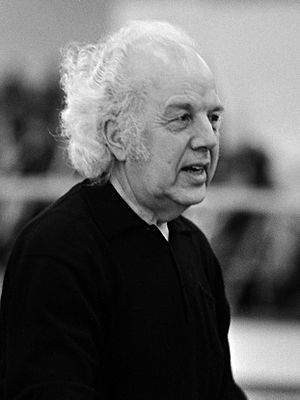Kurt Jooss facts for kids
Quick facts for kids
Kurt Jooss
|
|
|---|---|

Jooss in 1971
|
|
| Born | 12 January 1901 Wasseralfingen, Germany
|
| Died | 22 May 1979 (aged 78) |
| Occupation | Ballet dancer, choreographer |
| Years active | 1920–1968 |
| Known for | Founding Tanztheater |
|
Notable work
|
The Green Table |
Kurt Jooss (born January 12, 1901 – died May 22, 1979) was a famous German ballet dancer and choreographer. He was known for mixing classical ballet with theatre. Many people see him as the founder of Tanztheater, which means "dance theatre." Jooss started several dance groups, with the most famous being the Folkwang Tanztheater in Essen.
Contents
Life and Dance Journey
Kurt Jooss was born in Wasseralfingen, Germany. From a young age, he loved singing, drama, and art. He also played the piano and enjoyed photography.
Early Dance Training
Jooss began his dance career in the 1920s. From 1920 to 1924, he studied with Rudolf von Laban. Laban was an artist who developed new dance ideas. Jooss also danced lead roles in Laban's choreographies. Their style was part of a movement called Ausdruckstanz, which focused on expressive dance.
Jooss used stories and modern theatre styles in his dance pieces. This helped him create "Dance Theatre" works. He built on Laban's ideas and his system for writing down dance moves.
Starting His Own Company
Within a year of leaving Laban, Jooss started his own dance company. He called it "Die Neue Tanzbühne." Here, Jooss met Fritz Cohen, a Jewish composer. Cohen worked with Jooss on many of his most famous dances.
Jooss and Cohen believed that dance and music should be created together. They felt this helped express the dramatic idea in a united way. In 1925, Jooss and Sigurd Leeder joined other artists. They opened a new dance school called "Westfälische Akademie für Bewegung, Sprache und Musik." In 1926, Jooss and Leeder went to Paris. They studied classical ballet with the Russian ballerina Lubov Egorova.
Challenges and New Beginnings
In 1927, Jooss and Leeder's dance piece Dance of Death was seen as too modern. This led to changes at the theatre in Münster. Many of Jooss's friends and colleagues left. In the same year, Jooss moved his "Westfälische Akademie" to Essen. It then became the Folkwang Schule.
Focus on Meaningful Dance
Jooss did not like dances that had no story. He preferred themes that dealt with important moral issues. He used natural movements and large group dances. He also focused on character development to show political concerns of his time.
His most important dance work is The Green Table (1932). This piece won first prize at an international dance competition in Paris in 1932. It was a strong statement against war. He created it a year before Adolf Hitler became the leader of Germany. The Green Table is still seen as his most popular work.
Fleeing Germany
In 1933, Jooss had to leave Germany. The Nazis, who were in power, told him to fire the Jewish members of his dance company. Jooss bravely refused to do this. So, he, Leeder, Fritz Cohen, and other company members found safety in the Netherlands. Later, they moved to England.
After touring in Europe and America, Jooss and Leeder opened a school. It was located at Dartington Hall in Devon, England. During this time, Jooss choreographed a lighter piece. It was called "Ball in Old Vienna" (1932), which was very different from The Green Table.
Later Works and Legacy
In 1934, while in England, Jooss added new dances to his collection. One was Pandora (1944). This ballet showed upsetting images of human disaster and sadness. Some people later thought it seemed to predict the atomic bombs dropped on Japan a year later.
His company, the Jooss Ballet, toured the world. However, the company broke up in 1947.
Jooss left England in 1949 and returned to Essen, Germany. He continued to teach and create dances for 19 more years. One of his students during this time was the famous choreographer Pina Bausch.
Kurt Jooss retired in 1968. He died in Heilbronn, West Germany, in 1979. He was 78 years old and passed away from injuries after a car accident.
Kurt Jooss's dances are still performed today, especially The Green Table. His daughter, Anna Markard, oversaw companies that performed his works until her death. She made sure his original ideas for Dance Theatre were kept true.
See also
 In Spanish: Kurt Jooss para niños
In Spanish: Kurt Jooss para niños
 | Tommie Smith |
 | Simone Manuel |
 | Shani Davis |
 | Simone Biles |
 | Alice Coachman |

